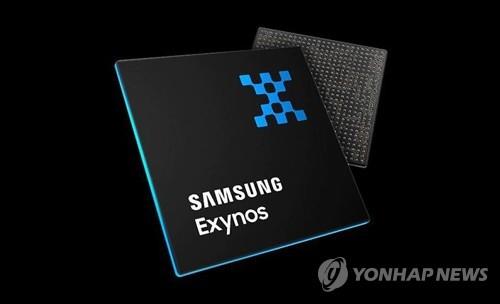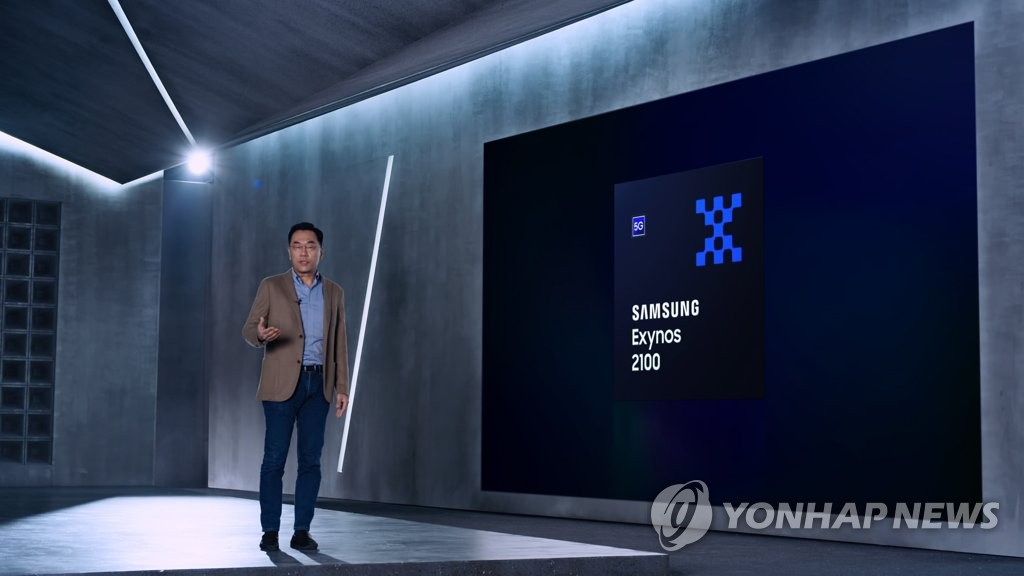- California Assembly OKs highest minimum wage in nation
- S. Korea unveils first graphic cigarette warnings
- US joins with South Korea, Japan in bid to deter North Korea
- LPGA golfer Chun In-gee finally back in action
- S. Korea won’t be top seed in final World Cup qualification round
- US men’s soccer misses 2nd straight Olympics
- US back on track in qualifying with 4-0 win over Guatemala
- High-intensity workout injuries spawn cottage industry
- CDC expands range of Zika mosquitoes into parts of Northeast
- Who knew? ‘The Walking Dead’ is helping families connect
Samsung ranks 5th in 2020 smartphone AP market: report
Samsung Electronics Co. was the world’s fifth-largest smartphone application processor (AP) vendor last year, a report showed Friday, as the South Korean tech giant eyes to expand its presence in the mobile microprocessor sector with more sales of its Galaxy devices.
Samsung, which makes the Exynos chipsets, represented 9 percent of the global smartphone AP market in terms of revenue in 2020, according to market researcher Strategy Analytics.
“The company’s in-house customer’s underperformance in the smartphone market limited its growth,” Sravan Kundojjala, an associate director at Strategy Analytics, said. “Samsung has had success with its Vivo 5G chip relationship in 2020.”


This undated image provided by Samsung Electronics Co. shows the company’s mobile application processor brand Exynos. (PHOTO NOT FOR SALE) (Yonhap)
Samsung’s mobile AP performance largely depends on its Galaxy smartphone sales. The company last year defended its status at the world’s largest smartphone producer but saw its handset shipments drop.
Qualcomm Technologies Inc. was the leading smartphone AP vendor with a revenue share of 31 percent, thanks to popular demand of its Snapdragon series, while Apple Inc. was the runner-up with a 23 percent share after its A14 Bionic, the world’s first 5-nanometer AP, got a boost from the launch of the iPhone 12.
China’s HiSilicon Technologies Co. came in third with an 18 percent revenue share, although its shipments dropped 20 percent due to U.S. sanctions on its supply chain partners, including Huawei Technologies Co.
Taiwan’s MediaTek Inc. was narrowly behind HiSilicon to rank fourth also with an 18 percent share.
The worldwide smartphone AP market grew 25 percent to a record US$25 billion last year, thanks to solid demand for 5G-supporting APs that accounted for more than 25 percent of all smartphone APs shipped in 2020, according to Strategy Analytics.
There was also increased demand for 7nm and 5nm APs, which benefited foundry firms, like Taiwan Semiconductor Manufacturing Co. (TSMC), as well as Samsung.
“Leading-edge 5nm and 7nm APs accounted for 40 percent of all smartphone AP shipments in 2020, boosting overall average selling prices,” Kundojjala said. “Smartphone AP shipments with on-device artificial intelligence (AI) engines crossed 900 million in 2020, up from over 700 million in 2019.”
Strategy Analytics projected that Samsung is likely to expand its presence in the mobile AP market this year with improved handset sales.
“Samsung Mobile is expected to perform better in 2021 with its increased shipments in the 5G space,” the researcher said. “Samsung will also see upside from its 5G chip relation with Vivo. In addition, Samsung is likely to benefit from HiSilicon’s challenges.”
Meanwhile, Samsung was also ranked fifth in the global tablet AP market last year.
It had a revenue share of 7 percent in 2020, behind MediaTek that had 8 percent, according to Strategy Analytics.
Apple dominated the tablet AP market with a 48 percent share, followed by Intel Corp. with 16 percent and Qualcomm with 14 percent.
The global tablet market grew 36 percent on-year to $2.6 billion in 2020 on the back of strong demand for tablets driven by COVID-19-induced trends, like remote working and distance learning, Strategy Analytics said.











